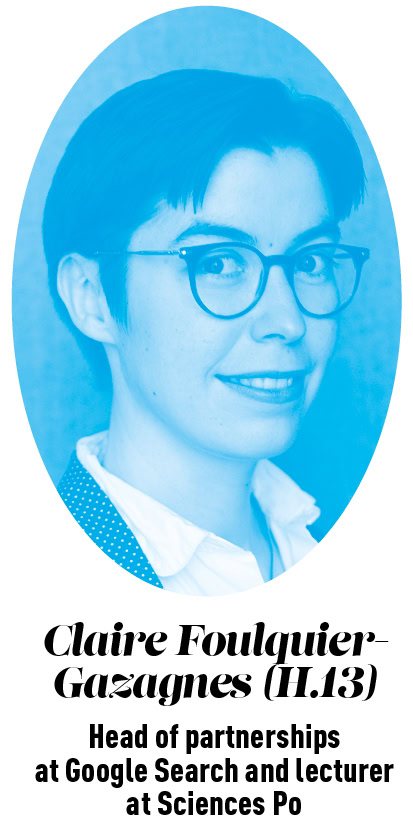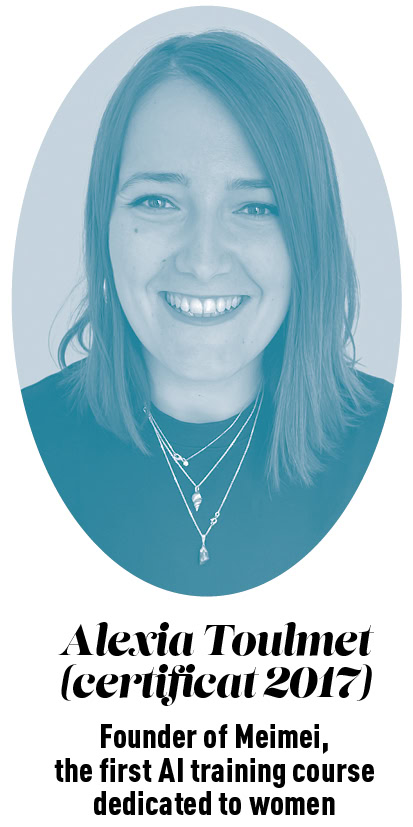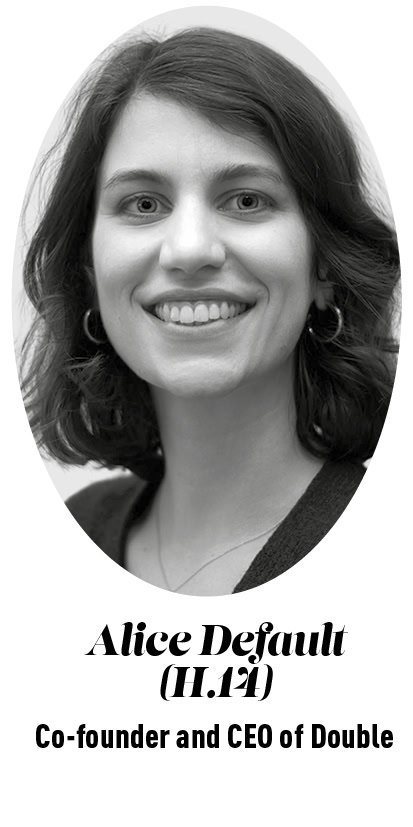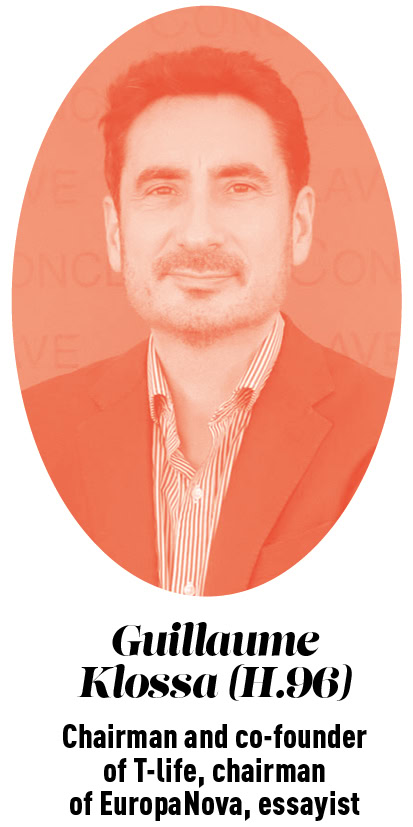AI and us : twelve HECs talk artificial intelligence

Illustration : © Emmanuel Polanco / Colagene
Artificial intelligence is being implemented in every field. Twelve HEC present an overview of the many developments brought about by this technology.
Public affairs
“Unlike what you might think, there are some real innovators in the public sector, and governments have woken up to the challenges of digital technology. AI and data provide invaluable decision-making support. As early as 2011, New York City Council was using data to prioritise building inspections as part of its fire prevention programme. In France, work has been carried out on accidentology to identify and make dangerous road intersections safer, or to prevent burglaries by adapting police patrols routes. Today, local authorities and governments are also using generative AI. In France, an algorithm is being tested to enable public servants to respond more quickly and effectively to the 16 million questions that users ask every year about social security benefits. The UK has also announced the launch of a chatbot to answer questions about visa applications, among other things. Today, it would be interesting for public services to take up the challenge of translation with the help of AI because a country’s administrative procedures are often complex for foreigners who don’t necessarily master the language.”

Governance
“The ability to collect, store and analyse data on employees and customers is a major growth driver for any business. And AI is multiplying this power. But these technologies also open the door to abuse. In recent years, the European Union has fined companies more than 1,400 times for breaching the General Data Protection Regulation (GDPR). This is why companies should put in place new organisational requirements as soon as they start using databases on human beings and set up a digital ethics committee whose role will be to approve any new project involving data processing. To do this, it should take five criteria into account: the source of the data, the way it is used, the purpose for such utilization, the data protection system and the way the confidentiality of data suppliers is guaranteed.”

Trade unions
“Enduring AI? No way! The CFDT trade union section at IBM, of which I am a member, has set up a working group to address this issue and defend employees in the age of AI. Our job is to keep an eye on legal and technological developments and to think collectively about new forms of discrimination.
I took part in the Business and Legal Forum’s meeting for legal advisers and the AI day organised by Anact (the French agency to improve work conditions). Too many companies, obsessed with short-term profits, confine themselves to soothing words about ethics without taking into account the consequences that the introduction of AI will have on employees. Faced with the redundancy plan announced by IBM at the beginning of 2024, I have launched an expert appraisal with the European works council and the firm Syndex to limit the damage caused by hasty redundancies motivated by the performance gains of artificial intelligence. Ultimately, I also intend to work on ensuring that AI can speed up industrial tribunal proceedings and make them more predictable.”

Skills
“I created an artificial intelligence training course for women. They tend to self-censor when it comes to technical subjects. In France, 29% of men have already used artificial intelligence software, compared with 16% of women. With new AI models and tools being released every week with artificial intelligence, it’s impossible not to feel FOMO (fear of missing out). And since AI is largely being adopted by businesses and set to be used in every sector and department of a company, it is essential to train for it. It can hard for female workers to find the time in their day-to-day life to get to grips with these subjects and discover new uses. The program, called Meimei, offers the possibility to align training sessions with work demands during a short 3-week course. It is designed to be accessible, with no technical pre-requisites. Learners receive daily case studies by e-mail, and take part in a weekly live meeting to share their experiences.”

Accounting
“Artificial intelligence (AI) is radically transforming corporate accounting. By automating routine tasks such as data entry and invoice processing, AI liberates accountants for high-value activities. Advanced AI systems offer predictive analytics and real-time reporting, fostering informed decision-making. AI’s detection of anomalies and potential fraud strengthens risk management and regulatory compliance. AI enables faster processing times, personalized financial advice, and tailored reporting solutions. Its integration into accounting practices not only optimizes operational efficiency but also allows companies to offer more strategic services. To remain competitive and innovative, companies must now embrace this technology. AI doesn’t replace accountants, but redefines their role, transforming them into financial strategists capable of bringing significant added value to their organization.”

Human resources
“Our product, Bluco, is a response to long and complex recruitment processes, especially for deskless jobs in high demand. Conversational AI allows candidates to apply directly via WhatsApp without sending a CV or a cover letter after swiping up on social campaigns, scanning a QR code on marketing campaigns or clicking on a company website. We also use AI to automatically pre-qualify and assess candidates and integrate their data directly into companies’ HR software. Such an innovation simplifies and accelerate the recruitment process as HR can, in a user-friendly way, reach an increased number of qualified candidates while reducing the time needed to contact and hire them. Our solution is already implemented in three countries. We believe we can revolutionize recruitment across Europe in the next two years and expand across the Atlantic.”

IT
“With our solution Corma, we use artificial intelligence to analyze license use, ease and centralize software management in medium-sized businesses. Indeed, shadow IT accounts for about 40% of IT spendings. Out technology addresses crucial costs and security issues as it detects anomalies, assess security risk and suggests corrective action in real time. In practical terms, our application enables IT managers to obtain a precise overview of their licenses and associated expenditure, identify under-used or non-compliant software, and rationalize and secure it directly from the platform. In our case, AI allows a better resources allocation. In the future, with the rapid evolution of AI, we think that Corma could go a step further by anticipating a company’s software needs and optimize its subscription portfolio. With this automation of key tasks, IT will play a more strategic role within companies in the future.”

Admin assistants
“Our platform Double uses AI to put executives in touch with part-time remote experienced assistants. It allows them to delegate appointment scheduling, expense reports, contact management, data entry, travel bookings and more. I’m often asked whether AI could one day replace human assistants. I don’t think so, because the assistant’s job is not just to carry out tasks, but also to understand the context, be proactive and build trust. AI is not currently capable of this emotional intelligence. On the other hand, we are convinced that assistants can rely on AI to optimize their tasks. Our use of artificial intelligence also focuses on leaving these duos free to concentrate on the most important tasks. We developed a tool called Mingo to clarify and summarize managers’ expectations, generate and send alerts or group together key information to prepare a document. It’s constantly learning about best practice in delegation.”

Sales
“Today, AI is integrated into every stage of the sales process, so much so that experts are talking about a ‘renaissance’ in sales, with ‘augmented’ salespeople relieved from everyday low added-value tasks. In fact, Gartner predicts that by 2028, AI will perform around 60% of sales tasks. Artificial intelligence is already helping to improve the qualification of prospects, predicting their behaviour and personalising messages to them. Before contacting prospects sales representatives can have at their disposal files summarising information about them, along with proposals for creative approaches, all generated by AI. Contacts can also be automated, while being personalised, with the help of AI. Artificial intelligence can also play an important role during face-to-face contact with the customer, thanks to a better understanding of the customer journey and real-time analysis of interactions with the sales representative. After the sale, AI can produce analyses of the customer’s lifetime value and establish follow-up programmes. But as with all technological equipment, it is essential to correct errors, interpret the results of analyses and manage exceptions.”

Banking
“Banks are like smart vaults: they keep our money and get it to yield a profit while limiting risks. These risks include fraud, business failure and unforeseen economic fluctuations. Artificial intelligence is now being used by the banking sector to assess default risks, perform predictive solvency analyses, analyze documents, detect fraud and monitor events that could affect a customer. It saves time and resources, like an assistant capable of predicting economic storms thanks to algorithms that analyze banking data flows in real time. With AI, the bank can manage systemic and environmental risks more effectively, while identifying investment opportunities. AI particularly boosts the competitiveness of asset managers and insurance companies because it notably calculates prices in real time.”

Health
“The T-life technology we are developing in collaboration with professors at the AP-HP and researchers at the Paris Polytechnic Institute enables early diagnosis and simplifies monitoring of cancerous and infectious pathologies. Our use of AI helps providing an exhaustive view of cellular structures. T-life is changing diagnostic microscopy the same way the James Webb Space Telescope unveils the mysteries of distant objects in space. By modelling light-matter interaction and using multiple, precisely positioned light sources, the solution creates ultra-detailed 3D representations of cells. AI, guided by physics, simplifies this complex reconstruction by allowing fine, differentiated cell classification and offers a new view of the infinitely small. The solution is remarkably effective at tracking the development of pathologies and the impact of treatments and leave room for a better medical monitoring.”

Audio
“Our start-up Quantum Squadra specializes in leveraging artificial intelligence to generate synthetic or cloned voices and translate audio content into over sixty languages, all while using the original speaker’s voice. This technology makes it possible to create personalized audio content quickly and cost-effectively. Our voice cloning product for digital audio advertising company Audion makes it possible to reduce studio, post-production and recording costs. We also developed an GDPR compliant voice cloning system that enables actors to receive fair remuneration for the use of their voice. We are currently working with a major European football club to produce a podcast using synthetic voices for the Asian market. In the future, we think our technology could revolutionize the film dubbing industry. We could even create a Harry Potter audiobook using the authentic voices of the actors in the film.”

Interviews by Marie Tourres, Lucie Guideau and Thomas Lestavel
Published by La rédaction

